- Home
- Helen Forrester
Twopence to Cross the Mersey Page 4
Twopence to Cross the Mersey Read online
Page 4
As she sat swaying in the noisy vehicle, Mother watched them work and realized that Mrs Foster had not asked if Father was employed or not; we discovered later that she had taken it for granted that he was not.
Darkness had long since fallen when Mother at last staggered into our living-room and collapsed on to the settee.
CHAPTER SEVEN
Half an hour after moving into our new abode on the following Monday, we began to appreciate some of the difficulties of living there.
Our coal was to be kept in a cupboard by the back door of the basement, where a series of old pantries had been converted for this purpose. This meant that every bucketful had to be carried up sixty-four stairs. We were to share the bathroom on the first floor with eleven other residents, and this meant innumerable trips for me up and down thirty-two stairs, since Brian, Tony and Avril were far too scared of the dark staircase and crypt-like, filthy bathroom to go down alone, and they needed help to manage in such a dirty place. I was getting resigned to disgusting bathrooms – they seemed to be part of the way of life in Liverpool, as I saw it.
The gas for the light in the living-room, and for a gas stove if we had had one to put in, came through a slot meter which ate pennies at an alarming rate. We did not know that such subsidiary meters were installed and set by landlords at the highest rate they thought they could squeeze out of their tenants. The landlords emptied these meters. They had only to pay the gas company the amount calculated on the reading of the main house meter in the basement, and they pocketed quite a substantial profit on this transaction, in addition to their rent. A more worldly-wise person than my mother would have inserted a penny and run the gas, to see how long a penny lasted, before accepting the tenancy.
Father went out and stopped a passing coal-cart, and the man brought in a sack of coal. He then went to buy cigarettes at a tiny corner store. Both he and Mother had been heavy smokers and found their enforced abstinence hard to bear.
We had brought with us on our tram journey a little oatmeal, a few potatoes, sugar and tea. There was still some baby food for Edward, and, since it was late afternoon by the time we arrived and Edward was whimpering, I made a bottle of formula and then some porridge for the other children. Alan had managed to get a smoky fire going, having lugged a handleless bucket full of coal upstairs by hugging it to his chest. His shirt, already dirty from a week’s wear, was now streaked with coal dust.
Although my head was throbbing and my throat was very sore, I ate some porridge gratefully.
As there was no hot water in the bathroom, I afterwards heated pans of water on our fire, and, starting with Avril, washed all the children, except Alan, who washed himself. Little Tony, fair and silent like Fiona, felt very hot, too, and I sat him on my knee and got him back into his grubby clothes as fast as possible.
I tucked Alan, Brian and Tony up in the bed in the attic, spreading over them their three overcoats, and left them squabbling with each other regarding the fair distribution of room in the bed.
My weary mother had been resting on the bed in the bedroom, and we now held a hasty debate about where Fiona, Avril and I should sleep, it being tacitly agreed that Mother, still in pain, had to have a bed. After a long argument, Father and I brought down into the bedroom the old door which had been left in the attic. We propped this up at each corner with a pile of long-forgotten Victorian books taken from the bamboo bookcase, and then covered it with crumpled newspaper found in the wardrobe. Avril had a wonderful time chasing the spiders we dislodged from the bookcase when we took the books out. She was delighted that Fiona, she and I were going to share this improbable bed. Father and Edward would share Mother’s bed.
Mother got up and went into the living-room, while I put Avril to bed, and when I joined my parents later, they were quietly muttering reproaches at each other through clouds of cigarette smoke. The problem was that we had only three shillings left from our parish relief, and we had to live, somehow, nearly three more days until Thursday afternoon when the benevolent parish would disgorge another forty-three shillings.
As I entered they broke off their recriminations and Father told me to go to bed. I went, thankfully, clinging to Fiona because I felt so dizzy. Fiona, as she took off her shoes preparatory to crawling in beside a soundly sleeping Avril, was crying silently as if her heart was already broken. Avril refused to make room for us when we pushed her gently, and grumbled drowsily that it was her bed. Desperate with the need to lie down, I slapped her legs and, with a howl and an occasional kick at her not-too-loving sisters, she made way.
With nothing over us except our overcoats, and only newspaper under us, it was unbearably cold, and yet at times I felt dreadfully hot.
After a broken night of bad dreams, through which I could hear Edward crying steadily most of the time, I staggered out of bed when Mother called me. I could hardly speak and my throat was swollen from ear to chin.
With eyes still closed she told me in a whisper to call the others, get them ready for school, cut them some bread to eat and make some milkless tea to drink.
Obediently, I built a fire and when I had fanned it with a newspaper into some semblance of heat, I put a pan of water on to it for the tea. Fiona got up from her rustling couch, leaving Avril still slumbering, and without being bidden, went downstairs to wash in the bathroom.
‘The Minister’s soap is nearly finished,’ she reported as she brought the remains of the tablet back to me.
I went upstairs to call the boys and clung to the rickety banister because of the dizziness that enveloped me. The boys were not making their usual rumpus, and I found Alan anxiously surveying a tearful Tony, whose neck was as swollen as mine, while Brian, his small brown face looking wizened and old, was lying miserably on the mattress and saying that he didn’t feel well and he wanted to go home.
‘I’ll tell Mother,’ I said, through nearly closed lips. I noticed, in terror, that we all seemed to have very large red spots on us – mine itched abominably.
Mother looked so utterly defeated when I told her about the boys and when she had really looked at me that my heart went out to her. She woke Father, who had been sleeping the deep sleep of exhaustion.
He sat up quickly, looking very quaint in his rumpled outer clothes, and put on his spectacles.
He peered at me in an effort to persuade his slumber-ridden eyes to focus.
‘I think it’s mumps,’ he said incredulously.
‘It’s my old tonsilitis,’ I said in a whisper. ‘My ear hurts like it always does when tonsilitis is coming.’
My voice and the room seemed to be receding from me and I burned with heat.
‘I think you have mumps as well.’
‘Does mumps bring you out in spots?’ I asked.
He was scratching absent-mindedly at himself, as I spoke.
‘Oh my God!’
He looked at his own arms, and then at my bright red tummy, which I obligingly bared for his inspection.
‘Bug bites, I think,’ he said slowly. ‘Saw them in the army.’
Slow tears welled into Mother’s eyes.
‘I can’t bear it!’ she cried out suddenly. ‘I can’t bear it!’ She hammered the mattress with closed fists. ‘I can’t bear it!’ she screamed, her pretty face distorted. ‘I can’t stand any more.’
She continued to shriek hysterically as we gaped at her in terrified silence. For me the scene was almost totally unreal, as fever gained on me; yet I knew that one of my parents had nearly reached the end of the amount of suffering she could accept, and it was difficult for me to contain my own screams of sheer fright.
There was the sound of heavy feet on the stairs and a coarse male voice shouted up, ‘For Christ’s sake, shut up up there!’
In spite of the pain it gave my throat, I began to cry.
‘Don’t cry, Mummy,’ I begged, ‘we’ll get through somehow.’
Father, ever optimistic like Mr Micawber that something would turn up, bestirred himself and scrambled out
of bed.
‘Yes, don’t cry,’ he said kindly. ‘I’ll tell Mrs Foster about the bugs – she’ll probably do something about them.’
Having seen Mrs Foster I doubted this, but I heartily agreed. Anything, I thought, to get that desperate look off Mother’s face and stop her screaming.
Slowly, as Father pottered round trying to bring some order to his distraught family, her cries gave way to sobs and she laid her head down on the mattress. She continued to weep, sobbing quietly to herself for hours.
Father trailed down to the basement to fetch some more coal and coaxed the fire into a more cheerful blaze than I had been able to create. Then we all went and stood by it while he took us one by one and looked us over.
Mother wept on, Edward and Avril slept.
In his opinion, Father said with a sigh, Tony and I had mumps. In addition, I undoubtedly had tonsilitis. Everybody was so used to my sporadic bouts of tonsilitis that this latter pronouncement did not bring me any particular sympathy. Rather, it was taken as an example of my usual awkwardness and waywardness of character. As Father said, ‘You would! Just at this time.’
It was presumed that Brian was also sickening with mumps.
We three sick children were piled into the attic bed. I hardly knew, by this time, what was happening around me. Apparently, Mother was persuaded to feed Edward, when he woke, and Father fed Fiona and Alan. He then took them to their new school, where he had to part with fourpence for a week’s fees.
I am not sure how my parents managed during the next few days, except that, according to Alan, they pawned my overcoat for two shillings in order to be able to buy coal. I remember, between bouts of delirium, seeing my mother crawling about, sometimes literally on her hands and knees, tears streaming down her face, as she struggled to look after Edward; and Fiona bringing me drinks of hot water with a tiny piece of Oxo cube dissolved in it.
The pain in my ears was intolerable, but there was no doctor to paint my throat with glycerine and tannin, no hot-water-bottle or aspirin to ease the searing pain, no drops in my ears to encourage a discharge. The mumps soon decreased, but it was several days before the agony in my ears suddenly diminished. There was a heavy discharge from them on to the bare mattress and my temperature began to go down. I became aware that Brian and Tony were no longer with me, and I called out, my voice seeming muffled and far away to me.
They both came clattering up the attic stairs.
Their faces seemed to have shrunk far more than the vanquished mumps justified. Brian looked more monkeylike than ever, and Tony’s blue eyes and the bones of his head seemed grotesquely prominent They both had large, scarlet spots about their faces and necks.
‘It’s very quiet,’ I whispered. ‘Where is everyone?’
‘Alan and Fiona are at school. Mummy’s in the living-room with the baby. We have to be quiet so she can rest.’
‘That is right,’ I said, trying to sit up and finding that the room swam around me, so that I was glad to lie down again. I looked imploringly at Brian. ‘I’m so cold, Brian. Could you find something more to cover me with?’
He immediately went and fetched his overcoat and put it over my shoulders.
‘Where is Daddy?’
‘He’s gone to see Mr Parish,’ volunteered Tony.
I smiled at his name for the public assistance committee.
‘Be a darling and bring me my specs,’ I commanded him. ‘I think I have to stay here a little longer. I still feel a bit hot between the shivers. Gosh, I do smell!’
The sides of my head were sticky with the discharge from my ears, but for the moment I had neither the strength nor the will to do anything about it
‘Tell Daddy I’m better, when he comes,’ I said. ‘You can play in here if you like.’ And I closed my eyes, thankful to be free of pain at last, and fell into a deep sleep while the boys played tag up and down the room. I awoke much later to find Father bending over me, trying to see me by the light of a candle stub. He felt my head. It was cool.
‘Feel better?’ he asked.
‘Yes.’
‘That’s my girl.’
‘How is Mummy?’
‘Much better. She is walking quite well now.’
‘Has she stopped crying?’ I could not keep a hint of fear out of my voice.
Father looked old and very tired, as he said quietly, ‘Yes, she is better now.’
‘Can I get up?’
‘Yes, I think it would be a good idea. We’ve got a fire today, so it’s warmer in the other room.’
I craved a hot cup of tea and I hoped that if we had a fire to boil the water we might also have a little tea in the cupboard. My legs almost refused to obey me and I clung to Father’s arm as I shuffled across the floor, down the attic stairs and into the living-room, where I was greeted rapturously by Fiona and Alan and with a wan smile by my exhausted mother. Avril was sitting on the floor in a corner, her face red and tear-stained, getting over a tantrum.
CHAPTER EIGHT
Brian and Tony went back to school, two subdued ghosts walking hand in hand for fear of being bullied by the heavily booted older boys in the street.
Mrs Foster, declaring that she had never had a complaint before, produced half a tin of Keating’s powder to repel the bugs. It did have some temporary effect, but the pests were coming in from the house next door and only a thorough stoving of both houses would ever have cleared them. We had to learn to live with them, just as we soon had to learn to live with head-lice which the children picked up in school.
I went through each child’s clothing before it set off for school, hoping to save them the humiliation of being labelled verminous; they were already cowed enough.
The days dragged by and both Mother and I became stronger, despite our poor diet of white bread, potatoes and tea. Though Mother’s physical health was improving, she seemed to withdraw further and further away from us. It was as if she could not bear to face the miserable existence which was our lot. She tried very hard to appear normal and calm, but attacks of hopeless hysteria descended on her without warning and she would rage and weep over some trifle, while whichever child happened to be the cause of the explosion made matters worse by trying to defend himself verbally. We were all still at the age when we believed that grown-ups knew what they were about and had sensible reasons for all that, they did, and in consequence we were thrown into real fright each time one of these distressing scenes occurred. The idea that a person’s life could be so shattered that they were unable to build anything new was unknown to us. We were young – we hoped for better times in the early future.
I learned to do practically everything for the baby, and when my legs were steady enough I borrowed Mother’s overcoat, which though too wide was not too long for me, and took Edward and Avril down to the street for fresh air.
In Victorian times the street had been quite a fashionable one and each house had a flight of steps up to its front door. The steps had heavy iron railings running up either side and round the area bordering the basement of the building, so that no one should fall into these tiny front yards below the level of the street.
Avril, like a squirrel released from a cage, skipped joyfully up and down the pavement, stopping occasionally to peek through the railings and catch a glimpse of someone’s basement home. Her pretty blue satin bonnet, though by now rather battered, caused quite a number of favourable comments from women sitting on the steps or standing in groups gossiping. The women were mostly of the labouring class, dressing in dull greys and blacks, some with flowered pinafores and most of them wearing black shawls as protection against the cold wind. Their hair either hung in greasy confusion to their shoulders or was braided and pinned up in fashions I had seen in early Victorian photographs. Their teeth, when they smiled at Edward, were uniformly bad or non-existent. I passed them without speaking as I shyly walked up and down with Edward in my arms.
A Spanish woman was seated on the steps of the next-door house. Her greying hair was
done high on her head and held at the back by a fine tortoise-shell comb and she watched my promenade with merry black eyes. Finally, she called me to her.
‘Can I see your baby?’ she asked in a throaty voice.
Obediently I brought Edward to her and lowered him so that she could see his sleepy face. She made delighted clucking sounds at him.
‘You not have pram?’ she asked.
‘No.’
She looked at me carefully, weighing me up.
‘Not your baby?’
‘Of course he’s my baby. He’s my brother.’
My innocence nonplussed her for a moment. Then she laughed and pinched my cheek.
‘So! He is little brother.’
‘Yes. Mummy’s ill,’ I volunteered, warmed by her cheerfulness.
‘I know. Mrs Foster tell me.’
She put her finger into Edward’s hand. He promptly clutched it, and she sighed gustily.
‘I got old pram. You have it. My baby big boy now. No more babies for me. You wait.’
She got up and tripped down the area steps and into the basement door under the main front steps, and I waited quietly, rocking Edward in my arms under the approving glances of her neighbours.
The best that could be said about that pram was that it had four wheels. Its lining was torn and grey with dirt; its wheels had no tyres; the ribs of its hood stood out as if it was hungry and its cover had so many cracks in it that it looked like a map of Europe. When it was moved it squeaked steadily in protest. It was, however, to be my constant companion for years and the cover had the virtue that it was firm enough to support an open book, so that I could read as I trudged along.
I was immensely grateful to my new friend and I happily laid the swaddled Edward into his new carriage. Cautiously I pulled it up the front steps of Mrs Foster’s house, then up the three double flights of stairs to our room. Bumpety-bump it went on each stair and bumpety-bump went the patient Edward inside it. Mrs Foster’s brother, Mr Ferris, infuriated by the regular pounding on the stairs, burst out of his room.

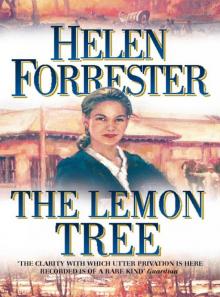 The Lemon Tree
The Lemon Tree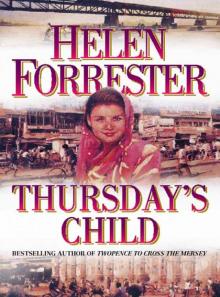 Thursday's Child
Thursday's Child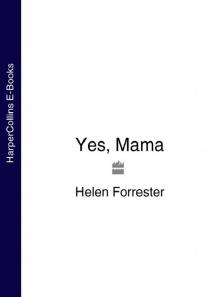 Yes, Mama
Yes, Mama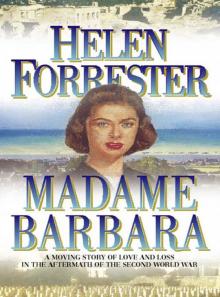 Madame Barbara
Madame Barbara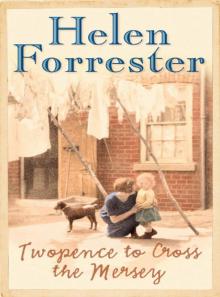 Twopence to Cross the Mersey
Twopence to Cross the Mersey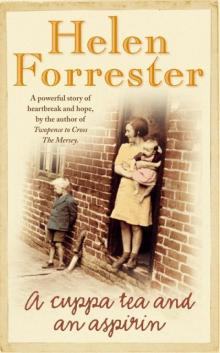 A Cuppa Tea and an Aspirin
A Cuppa Tea and an Aspirin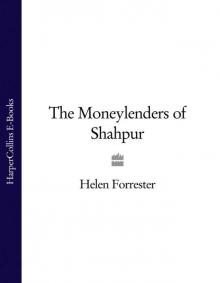 The Moneylenders of Shahpur
The Moneylenders of Shahpur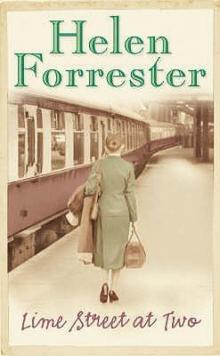 Lime Street at Two
Lime Street at Two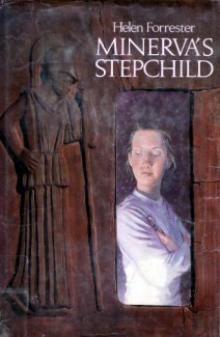 Minerva's Stepchild
Minerva's Stepchild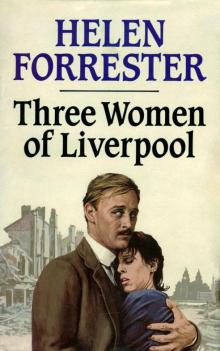 Three Women of Liverpool
Three Women of Liverpool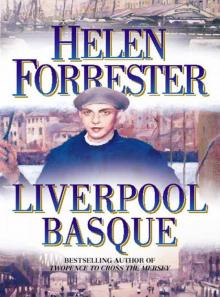 The Liverpool Basque
The Liverpool Basque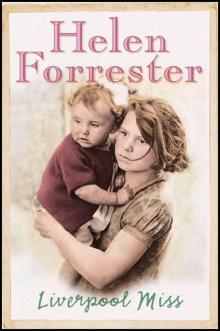 Liverpool Miss
Liverpool Miss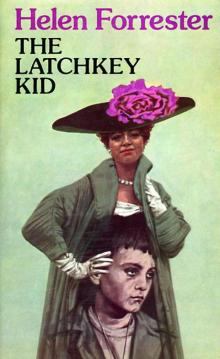 The Latchkey Kid
The Latchkey Kid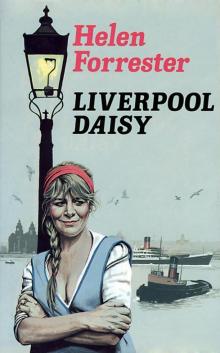 Liverpool Daisy
Liverpool Daisy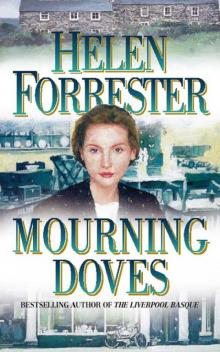 Mourning Doves
Mourning Doves